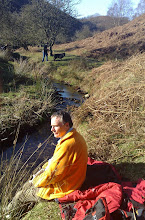I remember starting a new job abut 10 years ago and being introduced to an employee who was plugging away in his cubicle. As we moved out of earshot, the manager who was showing me around remarked, "Good guy, but a bit of a poet."
"I'm not sure I follow you," I replied, bristling internally at the insult to poetry (and to my new coworker).
"Not very productive," the manager said, "but easy to work with."
I've always had a reputation for being highly productive at work, but I also write poetry in my spare time. And, unlike this manager, I don't consider them entirely separate enterprises. Indeed, a well-channeled poetic sensibility is part of what makes me efficient. I joked about that dynamic in one of my first blog posts, "The Art of the Self-Imposed Deadline," which was about personal scheduling. But the relevance goes beyond that. Productive endeavors of all kinds — from getting through a rote task, to organizing your workday, to pacing a project, to crafting a big presentation or report — are not unlike well-executed poems. Here, I believe, are the commonalities:
1. A compelling opener. No matter what work lies ahead of you, an engaging first step sets the right tone. Start out with something intriguing that's intrinsic to, not distracting from, the task. I often choose a peculiar element that has the potential to inject humor (however dark) into the mission.
2. Elements of surprise. Too much predictability is deadly, even though it can appear to go hand-in-hand with brevity and efficiency. Let yourself make discoveries along the way rather than follow a rigid script. Just remember that there's a difference between a detour, which can derail you, and what poets sometimes call a "happy accident," which actually speeds you along despite the surprise.
3. Repetition as pleasure, not drudgery. To be sure, almost any endeavor requires some redundancy. The key is to feel like you're on a roll. Doing things in threes sometimes works, as I've discussed before in this blog. Or sometimes it helps to make certain parts into a game.
4. Endings that are new beginnings. Being exhausted and being energized are not mutually exclusive — the right balance is what athletes call "the good kind of tired." Similarly, effective poems tax you as they take you somewhere, but they also make you appreciate the journey and want to explore the next horizon. It might be a stretch for your job-related task to reach the same level of artistic edification, but if you build personal challenges into your plan, you'll feel like you've grown. And, chances are, the audience for your work will feel like that, too.
How do you find the poetry in your productive endeavors?

No comments:
Post a Comment